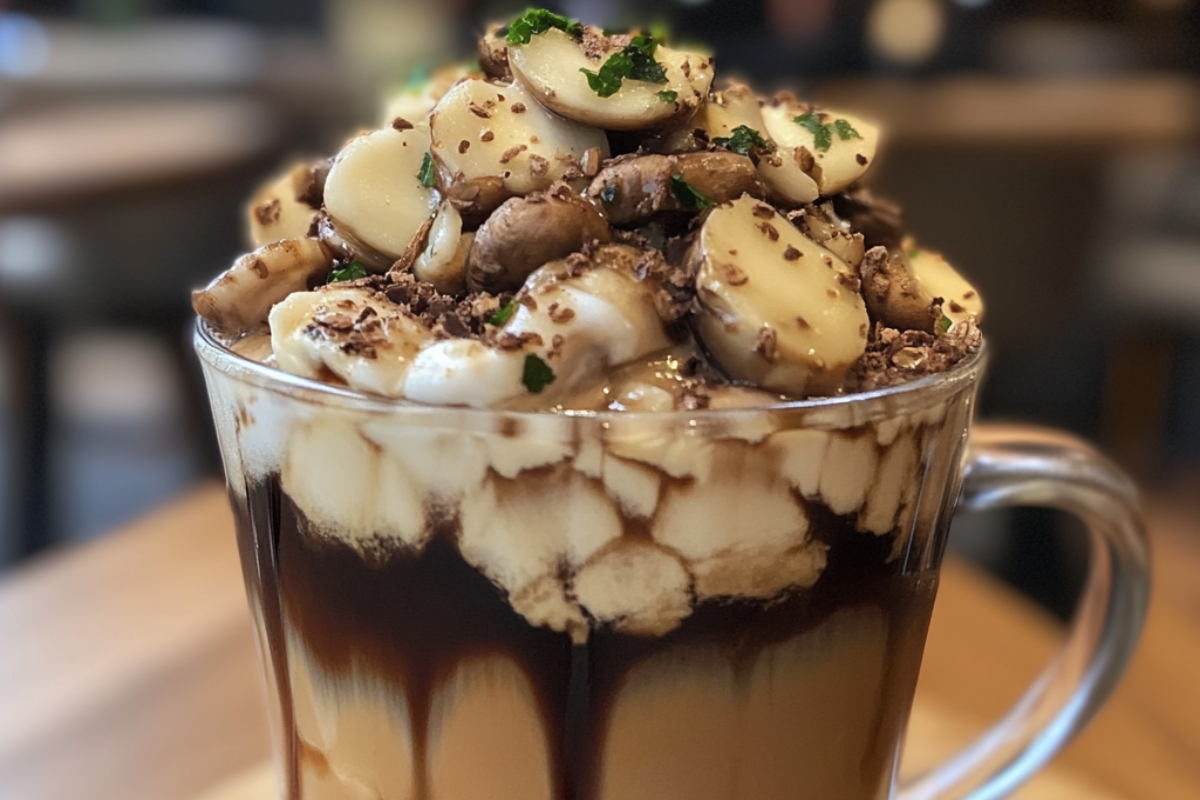The Ultimate Guide to Mushroom Coffee: Benefits, Side Effects, and More
Mushroom coffee has become a buzzword in the health and wellness community, known for its unique blend of regular coffee and medicinal mushrooms. As more people search for healthier alternatives to their daily routines, mushroom coffee offers a solution that promises not only to provide the energy boost of coffee but also to enhance health through the benefits of mushrooms. In this guide, we’ll dive deep into what mushroom coffee is, its health benefits, potential side effects, and how it compares to regular coffee.
What Exactly is Mushroom Coffee?
At its core, mushroom coffee is a blend of ground coffee and powdered medicinal mushrooms. This combination is designed to give you the caffeine kick of regular coffee while also delivering the health benefits of mushrooms, which are known for their adaptogenic properties. These mushrooms include varieties such as Reishi, Chaga, Lion’s Mane, and Turkey Tail.
- Reishi: Often called the “mushroom of immortality,” Reishi is valued for its immune-boosting properties and its ability to reduce stress (Cleveland Clinic).
- Chaga: Known for its antioxidant properties, Chaga is a powerful mushroom that helps combat oxidative stress and supports overall health (Verywell Health).
- Lion’s Mane: Famous for its potential to improve cognitive function, Lion’s Mane is a nootropic mushroom that supports brain health (Healthline).
- Turkey Tail: Rich in antioxidants, Turkey Tail supports immune function and gut health (Verywell Health).
These mushrooms are carefully dried and ground into a fine powder, which is then blended with coffee. The result is a beverage that retains the flavor and aroma of coffee but is infused with the additional health benefits of these powerful fungi.
The Health Benefits of Mushroom Coffee
Mushroom coffee is not just a trend; it’s rooted in the ancient practice of using mushrooms for their medicinal properties. Here’s a closer look at some of the potential health benefits:
1. Enhanced Cognitive Function and Mental Clarity
One of the most compelling reasons to try mushroom coffee is its potential to improve cognitive function. Mushrooms like Lion’s Mane are known for their nootropic effects, which can enhance memory, focus, and overall brain function. Studies suggest that Lion’s Mane may promote the growth of new brain cells, making it a valuable ally in the fight against cognitive decline (Healthline).
2. Immune System Support
Mushrooms like Reishi and Turkey Tail are rich in antioxidants and polysaccharides, which support the immune system. Regular consumption of these mushrooms may help strengthen your body’s defenses against illnesses by enhancing the activity of white blood cells, which are crucial for fighting off infections (Verywell Health).
3. Stress Reduction and Adaptogenic Benefits
The adaptogenic properties of mushrooms like Reishi and Chaga help the body manage stress more effectively. Adaptogens are natural substances that help balance the body’s stress response, reducing the production of cortisol and other stress hormones. This makes mushroom coffee an excellent choice for those looking to reduce stress and improve their overall well-being (Cleveland Clinic).
4. Improved Gut Health
Some mushrooms, particularly Turkey Tail, contain prebiotics, which are essential for maintaining a healthy gut microbiome. Prebiotics feed the beneficial bacteria in your gut, promoting better digestion and overall gut health. A healthy gut is linked to a stronger immune system, better mood regulation, and even weight management (Verywell Health).
5. Antioxidant Protection and Disease Prevention
Mushrooms like Chaga are packed with antioxidants, which protect the body from oxidative stress and free radical damage. This can help prevent a range of chronic diseases, including heart disease, cancer, and neurodegenerative disorders. The antioxidants in mushrooms also support healthy aging by protecting cells from damage (Healthline).

How Mushroom Coffee Compares to Regular Coffee
While mushroom coffee offers numerous health benefits, how does it compare to your regular cup of joe? Let’s explore the differences in caffeine content, taste, and nutritional profile.
1. Caffeine Content
Mushroom coffee generally contains less caffeine than regular coffee. The exact amount of caffeine depends on the blend, but a typical cup of mushroom coffee might have about half the caffeine of a regular cup. This makes it a good option for those who are sensitive to caffeine but still want the energizing effects of coffee. Some blends combine decaffeinated coffee with mushrooms, offering an even lower-caffeine alternative (Verywell Health).
2. Taste and Aroma
When it comes to taste, mushroom coffee is surprisingly similar to regular coffee. The earthy notes of the mushrooms blend seamlessly with the rich flavors of coffee, creating a beverage that is both familiar and slightly different. Some people notice a subtle difference in flavor, but it’s generally well-received by coffee lovers (Cleveland Clinic).
3. Nutritional Profile
Unlike regular coffee, mushroom coffee offers additional nutrients such as vitamins, minerals, and antioxidants. These nutrients contribute to overall health, making mushroom coffee a more nutritionally robust option. For those looking to add more functional foods to their diet, mushroom coffee is an excellent choice (Healthline).
Potential Side Effects of Mushroom Coffee
While mushroom coffee is generally safe for most people, there are some potential side effects to be aware of:
1. Digestive Issues
Some individuals may experience digestive discomfort, such as bloating or gas, when consuming mushrooms, especially if they are not used to them. This is because mushrooms contain certain compounds that can be difficult to digest for some people. If you experience any discomfort, it may be best to start with a smaller amount and gradually increase your intake (Verywell Health).
2. Risk of Kidney Stones
Mushrooms like Chaga are high in oxalates, which can contribute to the formation of kidney stones in susceptible individuals. If you have a history of kidney stones or are prone to them, it’s important to consult with a healthcare provider before adding mushroom coffee to your diet (Cleveland Clinic).
3. Caffeine-Related Side Effects
Although mushroom coffee contains less caffeine than regular coffee, it can still cause side effects in sensitive individuals. These side effects may include jitters, headaches, or sleep disturbances. If you are sensitive to caffeine, consider choosing a decaffeinated mushroom coffee blend (Verywell Health).
4. Allergic Reactions
Individuals who are allergic to mushrooms should avoid mushroom coffee. If you have a known mushroom allergy, consuming mushroom coffee could trigger an allergic reaction, which could be severe in some cases. Always check the ingredients list and consult with a healthcare provider if you’re unsure (Healthline).
How to Choose the Best Mushroom Coffee
With so many options on the market, choosing the best mushroom coffee can be overwhelming. Here are some tips to help you make the right choice:
- Quality of Mushrooms: Look for products that use high-quality, organic mushrooms. This ensures that you are getting the full benefits of the mushrooms without any harmful pesticides or contaminants (Verywell Health).
- Blends and Brands: Choose a brand that is transparent about the types of mushrooms used and their proportions in the blend. Some brands may use fillers or low-quality mushrooms, so it’s important to do your research.
- Price vs. Value: While mushroom coffee can be more expensive than regular coffee, consider the additional health benefits it offers. Investing in a high-quality product can provide better results and greater value in the long run (Cleveland Clinic).
How to Incorporate MC into Your Daily Routine
Incorporating mushroom coffee into your daily routine is easy and can be done in several ways:
1. Morning Rituals
Start your day with a cup of M Coffee to enjoy its energizing and cognitive benefits. You can brew it just like regular coffee, using your preferred method. Some people like to enjoy M Coffee as part of their morning ritual, along with other wellness practices like meditation or yoga. For more ideas on starting your day healthily, check out this guide from Healthline.
2. Recipes and Preparation Tips
M Coffee can be used in a variety of recipes. Try adding it to smoothies for an extra nutrient boost, or use it as a base for a latte or cappuccino. You can also experiment with adding spices like cinnamon or nutmeg to enhance the flavor. If you’re interested in more creative ways to incorporate functional foods into your diet, you might find this article from Verywell Fit helpful.
3. Alternatives
If you prefer to avoid caffeine altogether, there are mushroom/decaf blends and herbal alternatives available. These options provide the health benefits of mushrooms without the stimulating effects of caffeine, making them a great choice for those who want to enjoy mushroom coffee later in the day. For more information on caffeine-free alternatives, you can explore this resource from Healthline.

Common Myths and Misconceptions
Despite its growing popularity, there are still several myths and misconceptions surrounding mushroom coffee. Let’s address some of the most common ones:
- Myth: Mushroom coffee cures all ailments.
- Fact: While mushrooms offer many health benefits, they are not a cure-all. It’s important to view M Coffee as part of a balanced diet and healthy lifestyle, rather than a miracle cure.
- Myth: Mushroom coffee has no side effects.
- Fact: As discussed earlier, M Coffee can cause side effects in some individuals, particularly those with digestive issues or mushroom allergies. It’s important to be aware of these potential risks and to listen to your body’s response. For a deeper dive into the potential side effects, check out this Cleveland Clinic article.
FAQs
Is mushroom coffee safe during pregnancy?
- It’s best to consult with a healthcare provider before consuming MC during pregnancy, as certain mushrooms may not be safe for pregnant women.
Can I drink MC every day?
- Yes, many people enjoy mushroom coffee daily. However, it’s important to monitor for any adverse effects, especially if you are new to it.
Does MC taste like mushrooms?
- Not exactly. The flavor of mushroom coffee is earthy and slightly different from regular coffee, but it doesn’t taste like mushrooms. The taste is subtle enough that most people who enjoy coffee will likely find mushroom coffee palatable.
Is MC gluten-free?
- Most mushroom coffee blends are gluten-free, but it’s always important to check the packaging or the product’s official website to ensure there are no gluten-containing ingredients.
Are there any contraindications for M Coffee?
- Yes, individuals with mushroom allergies, digestive issues, or kidney problems should avoid mushroom coffee. Always consult with a healthcare provider if you have concerns about trying M Coffee, especially if you have underlying health conditions.
Conclusion: Should You Try Mushroom Coffee?
MC is a unique and innovative beverage that offers a range of potential health benefits, from enhanced cognitive function to better immune support and stress management. While it may not be a miracle cure, it can be a valuable addition to a healthy lifestyle. However, like any supplement or functional food, it’s important to be aware of potential side effects and to consult with a healthcare provider if you have any concerns.
Whether you’re looking to reduce your caffeine intake, boost your immune system, or simply try something new, MC might be worth exploring. With its combination of traditional coffee and the powerful health benefits of medicinal mushrooms, it offers a balanced and functional approach to your daily coffee ritual.
In conclusion, while MC may not replace your morning cup of joe entirely, it’s a fantastic option for those looking to incorporate more health-conscious choices into their diet. So, why not give it a try and see how it fits into your lifestyle? You might just find that it’s the perfect blend of taste and wellness you’ve been searching for.

